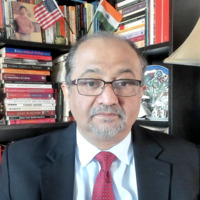
Paulina Pospieszna
Paulina Pospieszna is an Associate Professor of Political Science at the Adam Mickiewicz University, Poland. She received her Ph.D. (2010) in Political Science from the University of Alabama and worked as a post-doctoral fellow at the University of Konstanz and the University of Mannheim, Germany.
Her main research interests are democracy promotion, democratization and democracy backsliding, civil society, advocacy groups, NGOs, civic participation (especially youth activism), aid and sanctions as foreign policy tools. Geographically, she mainly focuses on Central and Eastern Europe. In her research she combines quantitative and qualitative approaches. She has published articles in Democratization, Europe-Asia Studies, Journal of International Relations & Development, International Interactions, Journal of Peace Research, Problems of Post-Communism, amongst others. She has recently published a book on entitled Democracy Assistance Bypassing Governments in Recipient Countries Supporting the “Next Generation” (Routledge). She is also an author of Democracy Assistance from the Third Wave: Polish Engagement in Belarus and Ukraine (University of Pittsburgh Press PITT Series in Russian and East European Studies).
Her main research interests are democracy promotion, democratization and democracy backsliding, civil society, advocacy groups, NGOs, civic participation (especially youth activism), aid and sanctions as foreign policy tools. Geographically, she mainly focuses on Central and Eastern Europe. In her research she combines quantitative and qualitative approaches. She has published articles in Democratization, Europe-Asia Studies, Journal of International Relations & Development, International Interactions, Journal of Peace Research, Problems of Post-Communism, amongst others. She has recently published a book on entitled Democracy Assistance Bypassing Governments in Recipient Countries Supporting the “Next Generation” (Routledge). She is also an author of Democracy Assistance from the Third Wave: Polish Engagement in Belarus and Ukraine (University of Pittsburgh Press PITT Series in Russian and East European Studies).
less
Related Authors
Muqtedar Khan
University of Delaware
Isaac Odoom
University of Alberta
Benjamin Isakhan
Deakin University
Richard Bellamy
University College London
Martin O'Neill
University of York
Noe Cornago
University of the Basque Country, Euskal Herriko Unibertsitatea
Andrew W Wilkins
Goldsmiths, University of London
Shabib H . Syed
University of the Punjab, Lahore, Pakistan
Camelia Dewan, PhD
University of Oslo
Alper Y DEDE
Zirve University










Uploads
Papers by Paulina Pospieszna
mający na celu promowanie idei i postaw demokratycznych, było dotychczas domeną
demokracji zachodnich. Dlatego badania w dziedzinie wspierania demokracji
zazwyczaj koncentrowały się na programach prowadzonych przez międzynarodowe
organizacje, bądź rządowe i pozarządowe organizacje, fundacje ze Stanów Zjednoczonych,
jak również z Europy Zachodniej. Jednakże niedawno do grona darczyńców
dołączyły również młode demokracje z Europy Środkowo-Wschodniej takie jak
Polska, Czechy, Słowacja bądź Węgry, które same tak niedawno były odbiorcami
tego typu pomocy. Biorąc jako studium przypadku działania Polski na Ukrainie i Białorusi
niniejszy artykuł analizuje działania polskich organizacji pozarządowych na
rzecz wspierania demokracji w krajach partnerskich w latach 1990–2015. Celem badań
było zbadanie przyczyn zaangażowania się polskich organizacji pozarządowych
we wspieranie demokracji, metod promowania idei i postaw demokratycznych oraz
charakteru współpracy ze społecznością obywatelską z krajów partnerskich.
democracy. Yet, it is unclear under which conditions states choose to set positive or negative
incentives. In order to answer which tool—democracy aid or democratic sanctions—is more
effective, one has to analyse the actual form of the provision of aid. Sanctions and democracy aid
can also be employed at the same time. The goal of this study is to determine their joint effect on
democratization in recipient countries. We argue that sending civil society aid or democracy aid
channeled through NGOs and the civil society when sanctions are in place, enhances the
effectiveness of sanctions as a democracy promotion tool because the civil society can be
empowered to introduce democratic changes in its country—so additionally to the top-down
pressure created by sanctions, there is bottom-up pressure exerted by the civil society. Our results
suggest that democratic sanctions are more likely to be successful if democracy aid bypasses the
government in a target state. Conversely, other forms of aid provision tend to decrease the
effectiveness of sanctions. In order to precisely explain the joint impact of positive and negative
incentives on democratization, we employ a new comprehensive dataset on economic sanctions
for the period between 1989 and 2015 which integrates and updates the Threats and Imposition of
Economic Sanctions and the GIGA sanctions data sets, merged with disaggregated OECD aid data
and V-Dem as well as PolityIV democracy scores.
democracy. Yet, it is unclear how far incentives and coercion
enhance democratization. Since sanctions and aid are often
employed at the same time, the goal of this study is to determine
their joint effect on democratization in target/recipient countries.
We argue that sending democracy aid through civil society organizations
enhances the effectiveness of sanctions as a democracy
promotion tool because the civil society is empowered to introduce
democratic changes. Thus, in addition to the top-down
pressure on the target government created by sanctions, there
is a bottom-up pressure exerted by the civil society. Our empirical
results show that democratic sanctions by the European Union
and the United States are more likely to have a positive effect
when aid flows bypass the government. Conversely, aid channeled
through the public sector mitigates the generally positive
effect of sanctions on democracy. In order to estimate these joint
effects, we employ a new comprehensive dataset on economic
sanctions: the EUSANCT Dataset which integrates and updates
existing databases on sanctions for the period between 1989 and
2015, merged with disaggregated OECD aid data and V-Dem
democracy scores.
parties to settle militarized disputes differs. The structural research tradition focuses on conflict
characteristics, while the individualist approaches highlight the background, skills and power
of a mediator, as well as the mediation strategy. This article reconciles these two approaches,
and examines especially the effectiveness of mediation strategies. Accounting for the selection
of mediation and the success of mediation attempts, we use the CWM 1945–2004 dataset.
The analysis demonstrates that mediators who were able to pursue a determined strategy face
a higher chance of success.
sanctions on Moscow. Despite increasing polarisation among member
states after imposition, the sanctions package was consistently
renewed. How can sanctions persistence be explained? While scholarly
accounts highlight German leadership, commitment to norms,
and policymakers’ engagement, the EU’s ability to uphold the
sanctions in the face of uneven support among member states
remains puzzling. With the help of a two-level game framework,
according to which actors make decisions based on the interplay
between the domestic and international levels, we argue that the
interaction between the Council and domestic politics helped sustaining
the consensus. To illustrate this dynamic, in an exploration
of domestic factions in Spain and Poland, two member states
displaying opposite attitudes towards Russia, we identify the presence
of at least one actor whose preference deviates from the core,
thereby facilitating consensus.
Civic education, i.e. activities aimed to teach citizens of recipient countries basic values, knowledge, and skills relating to democracy, has become a popular form of promoting democracy by NGOs from Poland, the Czech Republic, Slovakia, and Hungary. This paper examines whether democracy promotion programmes, such as civic education, implemented by NGOs from Central and Eastern European countries towards young people in former post-communist countries affect participants’ civic engagement and political participation. We test the impact of one of the civic education programmes on young people from Belarus, Moldova, Ukraine, and the Russian Federation. The analysis of the programme and the results of the survey conducted among the civic education programme’s former participants from 2004 to 2014 contribute to a better understanding how youth participation can be built through mechanism of knowledge created by outside actors. The paper reveals some potential of programmes focused on educating young people in diffusing democratic ideas and behaviour in the region; however, it also shows the limitations of methodology used to evaluate the impact of democracy promotion efforts.
mający na celu promowanie idei i postaw demokratycznych, było dotychczas domeną
demokracji zachodnich. Dlatego badania w dziedzinie wspierania demokracji
zazwyczaj koncentrowały się na programach prowadzonych przez międzynarodowe
organizacje, bądź rządowe i pozarządowe organizacje, fundacje ze Stanów Zjednoczonych,
jak również z Europy Zachodniej. Jednakże niedawno do grona darczyńców
dołączyły również młode demokracje z Europy Środkowo-Wschodniej takie jak
Polska, Czechy, Słowacja bądź Węgry, które same tak niedawno były odbiorcami
tego typu pomocy. Biorąc jako studium przypadku działania Polski na Ukrainie i Białorusi
niniejszy artykuł analizuje działania polskich organizacji pozarządowych na
rzecz wspierania demokracji w krajach partnerskich w latach 1990–2015. Celem badań
było zbadanie przyczyn zaangażowania się polskich organizacji pozarządowych
we wspieranie demokracji, metod promowania idei i postaw demokratycznych oraz
charakteru współpracy ze społecznością obywatelską z krajów partnerskich.
democracy. Yet, it is unclear under which conditions states choose to set positive or negative
incentives. In order to answer which tool—democracy aid or democratic sanctions—is more
effective, one has to analyse the actual form of the provision of aid. Sanctions and democracy aid
can also be employed at the same time. The goal of this study is to determine their joint effect on
democratization in recipient countries. We argue that sending civil society aid or democracy aid
channeled through NGOs and the civil society when sanctions are in place, enhances the
effectiveness of sanctions as a democracy promotion tool because the civil society can be
empowered to introduce democratic changes in its country—so additionally to the top-down
pressure created by sanctions, there is bottom-up pressure exerted by the civil society. Our results
suggest that democratic sanctions are more likely to be successful if democracy aid bypasses the
government in a target state. Conversely, other forms of aid provision tend to decrease the
effectiveness of sanctions. In order to precisely explain the joint impact of positive and negative
incentives on democratization, we employ a new comprehensive dataset on economic sanctions
for the period between 1989 and 2015 which integrates and updates the Threats and Imposition of
Economic Sanctions and the GIGA sanctions data sets, merged with disaggregated OECD aid data
and V-Dem as well as PolityIV democracy scores.
democracy. Yet, it is unclear how far incentives and coercion
enhance democratization. Since sanctions and aid are often
employed at the same time, the goal of this study is to determine
their joint effect on democratization in target/recipient countries.
We argue that sending democracy aid through civil society organizations
enhances the effectiveness of sanctions as a democracy
promotion tool because the civil society is empowered to introduce
democratic changes. Thus, in addition to the top-down
pressure on the target government created by sanctions, there
is a bottom-up pressure exerted by the civil society. Our empirical
results show that democratic sanctions by the European Union
and the United States are more likely to have a positive effect
when aid flows bypass the government. Conversely, aid channeled
through the public sector mitigates the generally positive
effect of sanctions on democracy. In order to estimate these joint
effects, we employ a new comprehensive dataset on economic
sanctions: the EUSANCT Dataset which integrates and updates
existing databases on sanctions for the period between 1989 and
2015, merged with disaggregated OECD aid data and V-Dem
democracy scores.
parties to settle militarized disputes differs. The structural research tradition focuses on conflict
characteristics, while the individualist approaches highlight the background, skills and power
of a mediator, as well as the mediation strategy. This article reconciles these two approaches,
and examines especially the effectiveness of mediation strategies. Accounting for the selection
of mediation and the success of mediation attempts, we use the CWM 1945–2004 dataset.
The analysis demonstrates that mediators who were able to pursue a determined strategy face
a higher chance of success.
sanctions on Moscow. Despite increasing polarisation among member
states after imposition, the sanctions package was consistently
renewed. How can sanctions persistence be explained? While scholarly
accounts highlight German leadership, commitment to norms,
and policymakers’ engagement, the EU’s ability to uphold the
sanctions in the face of uneven support among member states
remains puzzling. With the help of a two-level game framework,
according to which actors make decisions based on the interplay
between the domestic and international levels, we argue that the
interaction between the Council and domestic politics helped sustaining
the consensus. To illustrate this dynamic, in an exploration
of domestic factions in Spain and Poland, two member states
displaying opposite attitudes towards Russia, we identify the presence
of at least one actor whose preference deviates from the core,
thereby facilitating consensus.
Civic education, i.e. activities aimed to teach citizens of recipient countries basic values, knowledge, and skills relating to democracy, has become a popular form of promoting democracy by NGOs from Poland, the Czech Republic, Slovakia, and Hungary. This paper examines whether democracy promotion programmes, such as civic education, implemented by NGOs from Central and Eastern European countries towards young people in former post-communist countries affect participants’ civic engagement and political participation. We test the impact of one of the civic education programmes on young people from Belarus, Moldova, Ukraine, and the Russian Federation. The analysis of the programme and the results of the survey conducted among the civic education programme’s former participants from 2004 to 2014 contribute to a better understanding how youth participation can be built through mechanism of knowledge created by outside actors. The paper reveals some potential of programmes focused on educating young people in diffusing democratic ideas and behaviour in the region; however, it also shows the limitations of methodology used to evaluate the impact of democracy promotion efforts.